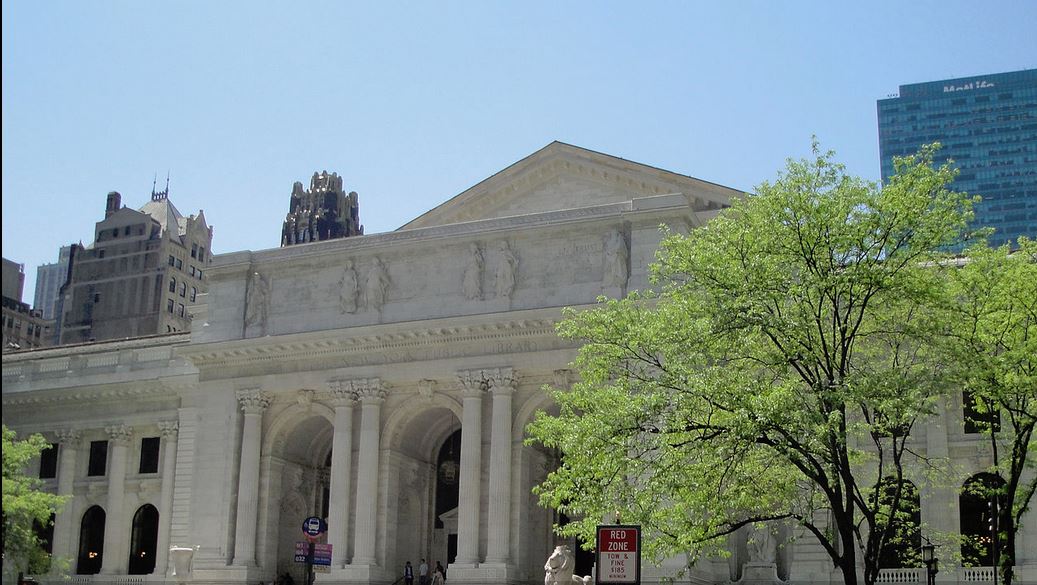One of those tricky ownership cases has arisen in New York over eight books that once were in a library, but ended up in private hands. The library claims the books are theirs, the private party says they are hers. The books have been in private hands for quite awhile. They once were in the library. How they traveled from point A to point B is a mystery.
The library is the renown New York Public Library. The private party is Margaret Tanchuck, a 50-year-old lady from a nearby suburb. Ms. Tanchuck said she discovered the books when cleaning out the jewelry store of her late father. She does not know where or how he obtained them, but believes they have been in the family for nearly three decades.
One more thing: These books are very valuable. This is not a contest over books deaccessioned or pilfered long ago that are worth a few hundred or even a few thousand dollars. There are eight books in total. Seven are bibles printed between 1672 and 1861. The eighth item is a manuscript workbook from Benjamin Franklin's printing house from 1759-1776. This item has been estimated to be worth more than $1 million, perhaps several million dollars.
Ms. Tanchuck brought the books to Doyle New York, the auction house, for an appraisal. Doyle soon realized they had once been held by the New York Public Library as they still had call numbers on the spines. New York Public quickly claimed they were still the owner, saying the books had been stolen. The library never filed any missing book reports, evidently having been unaware they were missing. However, their records indicated that they must have disappeared sometime between 1988 and 1991.
Ms. Tanchuck brought an action to have the books returned to her. However, New York Public contacted the U.S. Attorney to gain assistance in recovering the books, saying they were stolen. The Attorney weighed in on the library's side, demanding possession of the books. Meanwhile, the case was brought before a grand jury to determine whether to charge Ms. Tanchuck with knowingly attempting to sell stolen property. Her lawyer has responded angrily to such a charge, saying his client does not know how her father came in possession of the books, but believes the fact that New York Public made no attempt to report them stolen for almost three decades evidences that the books were not stolen, but transferred in some other manner.
Cases like this are not unusual these days. Books once owned by libraries or other government institutions show up in private hands. They departed the library many years ago, perhaps over a century, under terms unknown today. They might have been stolen, but more likely they were not deemed of value at the time and either given or thrown away. However, with no bill of sale existing, if there ever was one, the exact circumstances of its leaving is impossible to determine. Meanwhile, the book, thought to be worth little if anything at the time it left, is today worth a lot of money. The library wants it back, the possessor believes his or her ancestors obtained it legally, and a battle results, the court left to determine whether the book belongs to the long time possessor or the institution which, at least once upon a time, owned it.
This case is evidently different. Obviously, the U.S. Attorney believes it was stolen or he would not have intervened. Certainly, this case differs from the typical one in the item's value, particularly the value at the time it disappeared. This is not something that became valuable only after many years elapsed from the time it was removed from the library. Benjamin Franklin's workbook was very valuable in 1988. New York Public did not deaccession it for taking up valuable shelf space and stick it in the dumpster, at least not intentionally. Did Ms. Tanchuck's father obtain it illegally? Did someone without the authority give it to him? Did he he buy it cheaply from the library or pick it up as trash because the library did not realize its value (hard to imagine)? Did he obtain the book from someone else who got it in some unknown manner from the library? Did he sneak it out the door? We don't know how he got the book, and maybe we never will. As to how this case will be resolved, I would bet on the library. I think a court will ultimately conclude that a million dollar book did not leave the library with the owner's acquiescence.




















![<b>Sotheby’s, Dec. 11:</b> Darwin and Wallace. On the Tendency of Species to form Varieties..., [in:] <i>Journal of the Proceedings of the Linnean Society,</i> Vol. III, No. 9., 1858, Darwin announces the theory of natural selection. £100,000 to £150,000. <b>Sotheby’s, Dec. 11:</b> Darwin and Wallace. On the Tendency of Species to form Varieties..., [in:] <i>Journal of the Proceedings of the Linnean Society,</i> Vol. III, No. 9., 1858, Darwin announces the theory of natural selection. £100,000 to £150,000.](https://ae-files.s3.amazonaws.com/AdvertisementPhotos/00d5fd41-2542-4a80-b119-4886d4b9925f.png)




